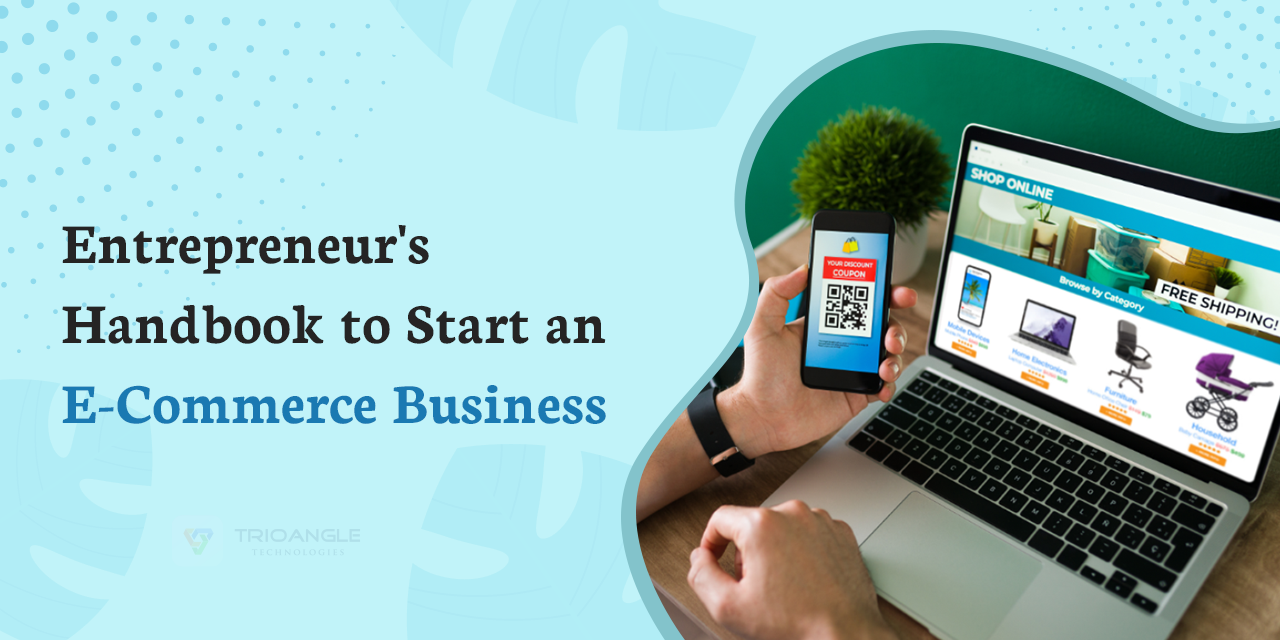In today’s digital era, companies choose e-commerce to broaden their reach and sales.
An e-commerce business refers to any company that sells goods or services through a website or other online platform. This type of business prototype has become increasingly prevalent over the years due to its nicety and accessibility for both consumers and capitalists.
The elevation of e-commerce can be attributed to various factors, including the snowballing plurality of smartphones and mobile devices, the ease of online payments, and the convenience of shopping from home.
In addition, the COVID-19 pandemic has revved the growth of e-commerce as more people hinge on online shopping to avoid contracting viruses.
All around, instituting an e-commerce business can be a lucrative and rewarding endeavor. That made entrepreneurs suppose of an e-commerce app development.
With the right strategy and execution, an e-commerce business has the potential to reach a wide audience, generate influential revenue, and provide a harmonious shopping experience for customers.
In this blog, we are going to dig into things about what is e-commerce business, how to start your own e-commerce business and more.
If you’re interested to start one, then this is the right place to hang on.
Without any wait, read ahead!
What Does The Market Say About The E-Commerce Industry?
There have been plenty of market predictions done on the e-commerce business. Every prediction has indicated the green candle for the e-commerce business’s future.
Statista, a leading statistical data provider, clearly states that it can hit 4.11tn USD this year.
Furtherly, it’s expected to reach a market volume of 6.35tn USD by 2027 which take the compound annual growth rate (CAGR) to 11.51% in the middle of 2023 and 2027.
This year’s revenue will be most generated by China, Statista states.
The user penetration will be around 58% this year and in 2027 it is foreseen to expand to 66.6%. By 2027, the user’s usage count will also be advanced to 5.29bn.
As of now, 70% of Americans are preferring online shopping which represents 18% of the global e-commerce share. Fascinatingly, an estimation predicts that 95% of purchases will happen via online mediums by 2040, wide opening the door for entrepreneurs to try out their luck.
How Is E-Commerce Business Forming A Trend?
After the introduction of E-Commerce, the way people approach business has intensely changed. From convenience to getting products delivered to the home, e-commerce has revolutionized the shopping experience.
Let’s view what stuff it has made use of to alter the global trend of purchasing.
Business Flow
E-commerce has made shopping more convenient and affordable.
Customers can browse and shop for products from anywhere, at any time, and on any device.
Online business has also made it possible for customers to compare prices, read reviews, and make informed purchase decisions before buying.
E-commerce has greatly augmented the product choice available to customers. They can offer a wider range of products to their customers as online stores are not capped by physical space or shelf space like brick-and-mortar stores are.
Totally, it has flipped the way customers get products in their hands. Instead of customers visiting a store to pick up their purchases, e-commerce businesses ship products straight to shoppers.
Welcomes Technologies
E-commerce businesses embrace a wide range of technologies to launch successfully and provide a seamless shopping experience for customers.
They started using specialized platforms to manage its stores, product catalogs, and order fulfillment processes by online alone.
It clutches content management systems (CMS) to make alluring content on its platform. It helps to personalize their products which nudges people to make instant purchases.
By going one step ahead, it makes use of customer relationship management (CRM) to record relevant data about every customer. It improves the business exceptionally as business owners get analysis about where to focus to invite new sales.
Also read: How Much Does It Cost To Start An ECommerce Business?
How The Trend Satisfies Customers
Be it day or night. Customers can browse and make purchases of their desired products if they know about online markets.
With their mobile screen or laptops, they can digitally order products which will be sent to their door address in a day or two. If they are subscribers, they get them even within a day.
They don’t have to mark a day on the calendar to visit shops. They don’t have to travel and waste time in queues to get the bill.
Rather, they can lie on their sofa and do shopping just by swiping their smart devices.
Even payments can also be made digitally.
This satisfaction customer enjoys was encountered never before. That’s why statistical data predicted that almost 95% of the purchases will happen online which ultimately indicates e-commerce.
In the coming days, we may see stores shutting down and business that happens with the storehouse itself. Though that happens, it will not tend to be a big jaw-dropper as people start searching more about how to start a successful ecommerce business themselves.
How It Makes Use Of Media
Businesses are now reaching out to customers unorthodoxly. It doesn’t go with dialing customers and wishing them to make a visit to stores to grab exciting offers.
Now it makes use of social media to get through to wider customers at a moment.
Platforms such as Facebook, Instagram, and Twitter are popular channels for online selling business to promote their products, engage with customers and enhance brand presence widely.
They create targeted advertising campaigns, post product updates and promotions, and respond to customer inquiries. It becomes a key to fusing the gap between businesses and customers.
Other than social media marketing, they use e-mail marketing, audio-video marketing, search engine optimization, and affiliate marketing. These will significantly reduce the time for growing the business. These are the tricks that provide answers to how long it takes to start an ecommerce business.
These media channels not only aid them to get closer to their customers but also increases product knowledge and awareness. Eventually, it boosts customer product engagement and paves the way for better sales.
How Can Entrepreneurs Develop And Launch E-Commerce Businesses?
Under this segment, the aspects and methods for entrepreneurs to enter the e-commerce business are discussed. Read them carefully and understand them properly. It will be useful for you in the near future.
Business Plan
For the success of any e-commerce business, having a concrete business plan is essential. Do you know how hard it is to start an e-commerce business without a business plan? Let’s see how it helps you!
Having a business overview is also important. It consists of the purpose of starting this business, the market’s target, the products and services to provide, and finally, the future goals.
Start from the research. Gather information on competitors, partners, friendly markets, and gaps in the industry. It will assist you in identifying your unique selling proposition (USP).
Posses a clear idea of what products and services to offer. For that, find the target market before concluding the products and services part.
Once the product and services are confirmed, get a plan to reach the target market.
Outline pricing strategy, distribution channels, and any other tactics to drive sales.
Deciding The Types Of Business To Start
There are numerous types of businesses, and the best one to start will depend on various factors, such as personal interests, market demand, competition, available resources, and growth potential.
Here are four types of businesses that can be considered to begin an ecommerce business:
E-commerce business: E-commerce businesses are becoming more popular by marketing products or services through online platforms. Competition can be intense as this business requires low setup costs and can reach a vast customer base in a short time.
Service-based business: A service-based business provides services to customers, such as conferring, coaching, cleaning, or restoration services. This type of business can be started with the tiniest investment however, building a strong reputation and securing clients can take time and effort.
Franchise business: A franchise business involves buying a license to operate a business model that’s already established and proven successful.
Manufacturing business: A manufacturing business involves producing products to sell to customers. This can be capital-intensive, requiring a significant investment in machinery, raw materials, and labor. Yet, it can be profitable, and the products can be sold to distributors or straight to patrons.
Keeping Track On Licensing and Policies
Here, how to get an e-commerce business license is discussed in detail.
Depending on the type of e-commerce business, obtaining licenses and permits may vary. If selling products that are regulated by a government agency, then have to obtain specific licenses or permits from the relevant department.
To sell electronic appliances, you need to get a node from the Ministry of Electronics and Information Technology.
In spite of gathering and controlling customer data, complying with online privacy laws, such as the General Data Protection Regulation (GDPR), is indispensable.
Have to follow the Federal Trade Commission Act, which forbids misleading advertising and unjust business habits.
It’s better to stay informed about the regulations and policies that change frequently.
Subscribe to business newsletters, read articles, and attend webinars on how does ecommerce business work to stay up to date on the changing conditions.
Choosing the Right Technical Partner
Look for a technical partner with expertise and a good background in e-commerce mobile app development.
Assure that technical confederate can provide springy and scalable solutions that can house business’s changing needs.
E-commerce app development requires ongoing reinforcement and upkeep to provide optimal performance and uptime.
It’s highly recommendable to hire a technical partner who can provide reliable support and maintenance services.
Contemplate the cost of the technical partner’s services and confirm that they fit within the allotted funding.
Scrutinize for a companion who can provide cost-effective solutions without compromising on the quality of service. When you start searching about how to start your own ecommerce business, start to find the best developers to get most of them even at the beginning of the project. It also helps you to build a successful ecommerce business.
Monetization Techniques Of E-Commerce Business
Advertisements
Third-party advertisements help to generate income without any investment.
A retailer will place an advertisement for his product on an online shopping site. It doesn’t mean the site owner should possess the product to make sales.
Instead, the third-party retailer will keep the product in their store.
When a call of action happens, they directly sell the product to the customer.
For this, they pay some commission to that site owner for bringing sales to their business.
By involving more third-party ads, an online selling business can earn income without stressing about selling its product.
Amazon is the perfect example of this type of monetization program. They don’t have any stores to keep products and export them when sales happen.
Instead, they allow the store to list their products and improve their sales with the online platform i.e. Amazon’s website.
Product Promotions
To improve product sales and customer engagement, e-commerce businesses use a strategy called ‘product promotions.’
They offer discounts or coupons for a specific product to incentivize customers to make a purchase.
They launch limited-time offers to induce customers the feeling of fear of missing out (FOMO). It works well to sell products by creating a sense of urgency.
FOMO plays skillfully and pushes customers to place an order before the limited-time offer expires.
Like that, they offer rewards programs, bundling, flash sales, seasonal sprees, etc.,
Note: It’s important to check whether the products promoted are in stock. Ensuring that the promotional content is clearly communicated to customers will play much value here. Finally, the call to action should be more tempting. So customers will make a purchase without a second thought.
User Subscriptions
Providing subscription plans to customers will generate good income.
Sales for business will happen regularly as subscribers will receive products repeatedly.
By keeping premium services for subscription, an e-commerce business can earn more than expected.
To sell subscription packs, provide instant product delivery, discounts on brands, and all-time delivery to subscribers alone. Then the packs will be sold fastly.
It not only yields revenue but also enhances the selling rate of products.
Transaction Charges
E-commerce businesses charge transaction fees from merchants. It’s for authorizing them to receive payments from customers electronically.
They have to pay charges of 0.5% to 5% of the total value of the payment transaction.
The charges vary according to the service or product purchased by customers.
They can charge customers too for pursuing payments digitally. But, it’s up to their wish.
Transaction charges help them to overcome the bank processing fee. Also, they can earn from this to yield additional income.
Wrap-Up
Starting an e-commerce business mandates prudent planning, study, and concrete knowledge of the market and target audience.
Consider various factors such as product preference, e-commerce app development or website creation, commerce strategies, and customer courtesy to flourish in this admiringly competitive industry.
By following the steps outlined in this blog, entrepreneurs can lay a strong foundation for their e-commerce business to become a billionaire in this industry. This is how I start the ecommerce business and is going successfully with customers and markets.
However, it’s important to recognize that building a successful e-commerce business demands time, forbearance, and industriousness.
So stay focused, keep discovering, and be a volunteer to adapt to changing market conditions to achieve business goals.
Overall, the blog provides a comprehensive handbook on how to create an e-commerce business plan for anyone looking to start an e-commerce business.
No doubt, it will be a beneficial resource for many aspiring entrepreneurs.





